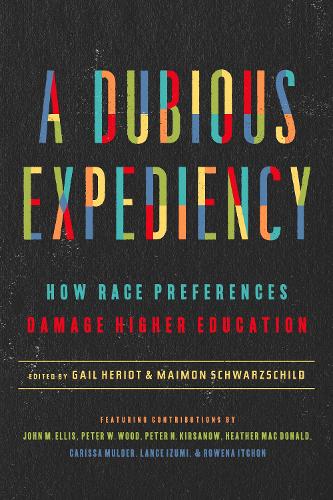
A Dubious Expediency: How Race Preferences Damage Higher Education
(Hardback)
Publishing Details
A Dubious Expediency: How Race Preferences Damage Higher Education
By (Author) Gail Heriot
Edited by Maimon Schwarzchild
Encounter Books,USA
Encounter Books,USA
3rd August 2021
United States
Classifications
General
Non Fiction
370.8
Physical Properties
Hardback
336
Width 152mm, Height 228mm
Description
Is higher education on the right road The authors of these eight essays are hardly the first to think not.
In 1976, in the now-famous Bakke case, the California Supreme Court had to decide whether what some view as the good kind of race discriminationpreferential treatment for minorities in college and university admissionsviolates the Constitution. To Justice Stanley Mosk, up to then considered by many to be a civil rights hero, the answer was clear. Writing for the majority, he insisted: To uphold [the University of Californias argument for race-preferential admissions] would call for the sacrifice of principle for the sake of dubious expediency and would represent a retreat in the struggle to assure that each man and woman shall be judged on the basis of individual merit alone.
Alas, the university took its case up to the U.S. Supreme Court, where the Justices fractured into three camps. The result was to open the door to more than a half-century of diversity admissions.
These policies have never been popular. When voters get the opportunity to vote them down, they almost always do, beginning with Californias Proposition 209 in 1996. In 2020, California voters shocked that states political and business elite by decisively rejecting an effort by the legislatureknown as Proposition 16to repeal Proposition 209.
But voters in most states never get that opportunity.
At this late date, getting back on the right roadaway from group preferences and from the cultural changes they have wreaked on campuswont be easy. Yet, as the essays in this volume demonstrate, it needs to be donesooner better than later.
Reviews
The unique advantage of this work in the continuing discussion of race-focused policy and practice is that it helpfully focuses on the experience of affirmative action in a compelling manner. Beyond the moral and philosophical objections to affirmative action, the account of the experience itself powerfully justifies concern for the ills still being done in the pursuit of a vain dream. William B. Allen, former chairman, U.S. Commission on Civil Rights
Good intentions all too often produce bad results. Prime example: racial quotas and preferences in higher education. As nine eminent writers explain in A Dubious Expediency, these violations of the Civil Rights Act of 1964 have not only harmed colleges and universities but have hurt most of all the intended beneficiaries. Michael Barone, Washington Examiner
So much that is written or said about affirmative action is demonstrably false or goes uncontested, allowing the debate about this vital issue to be resolved on the basis of emotions and tired clichs. This anthology will change all that. Ward Connerly, former regent of the University of California
For half a century, supporters of race preferences have used every trick to force their policies on higher education. They have been sold as diversity programs, a revision of traditional civil rights theory, and even reparations. But as this book compellingly notes, they remain unpopular no matter the label. In 2020, voters in deep-blue California shocked the country by decisively rejecting race preferences. The authors of this book are right: Its time the rest of the country realized this is an exhausted idea that is causing enormous damage to higher education. John Fund, National Review
Author Bio
Gail Heriot is a professor of law at the University of San Diego and a member of the U.S. Commission on Civil Rights. She sits on the board of directors of the American Civil Rights Project, Californians for Equal Rights, the National Association of Scholars, and its state affiliate, the California Association of Scholars. She was co-chair of both the campaign for Californias Proposition 209 in 1996 and the successful campaign to prevent its repeal in 2020. She blogs at Instapundit and the Volokh Conspiracy.
Maimon Schwarzschild is a professor of law at the University of San Diego and an affiliated professor at the University of Haifa. He is a member of the California State Advisory Committee to the U.S. Commission on Civil Rights. He is a member of the editorial board of the Journal of Law & Philosophy. He is an English barrister and has been a visiting professor at the University of Paris/Sorbonne and the Hebrew University in Jerusalem.
